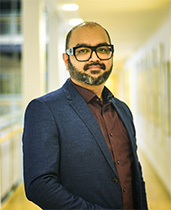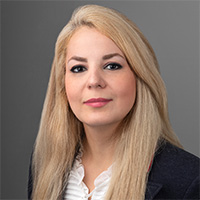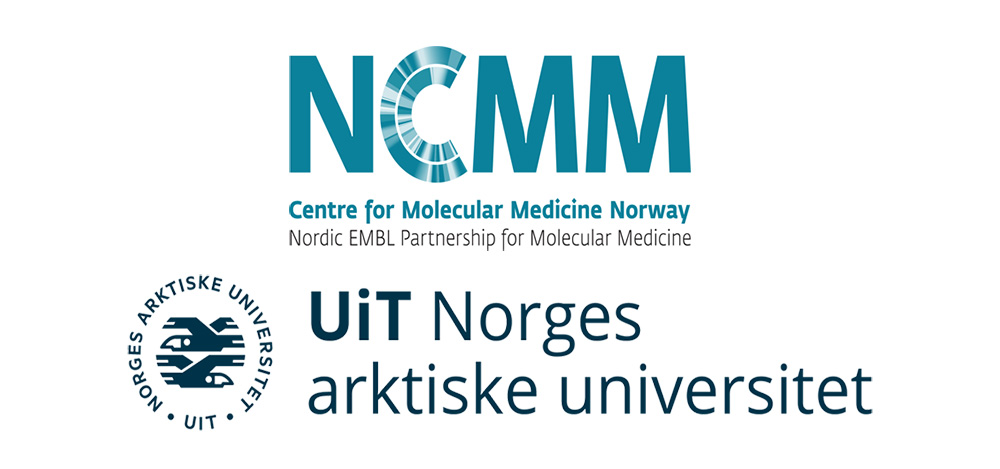In June 2021, NCMM and UiT agreed to establish and co-fund a pilot collaboration. It was designed to spark innovative research between NCMM group leaders and young researchers at the Faculty of Health Sciences, UiT. Altogether, 1.2 million NOK was awarded as seed funding to four projects, which will take place in 2022.
NCMM, as a national research centre, highly values this pilot mechanism. The aim of the pilot is to strengthen NCMM’s national collaborations beyond the already existing Associate Investigator network. NCMM will use the experience of this project to establish similar scientific collaborations with researchers at institutions across Norway.
— NCMM joins UiT in congratulating the 4 joint projects for receiving this seed funding. We are certain that this will lead to fruitful scientific collaboration and intend for the experience of this initiative to lead to further national institutional collaboration in Norway, commented NCMM Director Janna Saarela
— I'm very excited to start working with these two talented researchers from UiT (Dr Ilona Urbarova and Dr Erik Knutsen) to use computational approaches to improve our understanding of cancer heterogeneity and of the mechanisms that contribute to metastasis. These efforts may ultimately contribute to improved, tailored treatment options for cancer patients. The joint seed funding initiative was a great way for me to learn about the cancer research being done at UiT and to make new connections. I hope that these pilot projects will form the basis of long-term collaborations, commented NCMM group leader Dr Marieke Kuijjer
Dr Marieke Kuijjer and Dr Ilona Urbarova: Towards precision treatment for lung cancer patients from serum cfRNA – a pilot study

NCMM group leader Dr Marieke Kuijjer will collaborate with Dr Ilona Urbarova to study lung cancer signals in blood samples that can guide treatment strategies.
Ilona Urbarova is a postdoctoral research fellow in the Systems Epidemiology group at the Department of Community Medicine, UiT. She is a molecular biologist and bioinformatician focusing mainly on “Big Data” analyses of lung cancer patient samples.
Currently, the choice of lung cancer treatment is difficult due to the disease heterogeneity and unpredictable individual responses to treatment strategies. The two major subtypes of non-small cell lung cancer have drastically different biological signatures, yet they are often treated similarly. This pilot study will compare lung cancer signals from different blood sample types, whole blood and serum. We will use multiple data analysis methods based on both similarities of individual samples and interaction networks to find biomarkers that can guide lung cancer treatment strategies.
— This is my first project as a principal investigator, and I am excited to start the project soon. I am extremely glad and thankful for getting this seed funding and the opportunity to collaborate with such an excellent scientist as Marieke Kuijjer at NCMM. I hope that the collaboration will be fruitful and can be continued after this project ends. I am also looking forward to learning new “Big Data” analysis methods through this project, Urbarova commented
Dr Irep Gözen and Dr Jonathan Hira: BacPac (Bacteria Capturing Programmable Artificial Cell System)
NCMM group leader Irep Gözen will collaborate with Dr Jonathan Hira to capture and

monitor pathogenic bacterial cells in real time using artificial protocell systems.
Jonathan Hira is a postdoctoral researcher in the Host Microbe Interactions (HMI) group led by Professor Mona Johannessen at UiT. His research focuses on the field of clinical microbiology, identifying pathogenic bacterial cells, like Staphylococcus aureus, that behave as nonconformist within a population having the same genetic makeup. Most of these variant pathogens are hard to trace and they often escape routine clinical diagnostics. These variants are often engaged in promoting serious detrimental health issues like antimicrobial resistance that account for deaths globally.
— This seed funding will enable us to initiate an exciting adventure in the field of nanotechnology under clinical microbiology at UiT. Our focus is to use this funding to create a prototype concept that can aid to acquire novel knowledge about phenotypic heterogeneity of pathogenic bacteria at single cell resolution. It will facilitate us to improve rapid diagnostics of multidrug resistant microbes and their virulence profile, Hira explains
Dr Marieke Kuijjer and Dr Erik Knutsen: Development of an epithelial–mesenchymal transition score for prognostic evaluation of breast cancer

NCMM group leader Dr Marieke Kuijjer will collaborate with Dr Erik Knutsen to study the cancer cells present in lymph nodes.
Erik Knutsen is a researcher in the Tumor Biology Research Group, in the Department of Medical Biology, UiT. He mainly works with transcriptome analysis and started his own research project studying breast cancer metastasis in August 2020.
In breast cancer, the first place the cancer cells spread to are the regional lymph nodes. Currently it is not known how the cancer cells are affected by this new microenvironment. Marieke and Erik will study the cancer cells present in lymph nodes in order to understand if the lymph node itself is involved in the further spread of the cancer cells to more distant places in the body. This information can in the future be used in the clinic to help determine if breast cancer patients have a higher risk of metastasis and to help guide treatment.
Securing this seed funding has provided Erik with the opportunity to boost the development of the project.
— Being able to collaborate with a prestigious scientist at NCMM is of great importance to me and will increase the potential and speed of the project. I believe that having good collaborators is one of the most important aspects of success in research. The funding is therefore a great opportunity for establishing new collaborations. Furthermore, for a young researcher, being successful in securing funding is extremely important for building up the CV. I’m very much looking forward to learning from a talented bioinformatician, to discuss the results, and to generate new knowledge together, Knutsen commented
Professor Janna Saarela and Dr Simin Jamaly: Kidney Inflammation Signature (KIS): Validation of KIS as a Potential Disease Progression Biomarker in Autoimmune Diseases

NCMM Director Janna Saarela will collaborate with Dr Simin Jamaly to identify perfect marker(s) for diagnosing, predicting, and monitoring kidney inflammation in lupus nephritis and multiple sclerosis.
Simin Jamaly is a postdoctoral research fellow in the RNA and Molecular Pathology research group, in the Department of Medical Biology, UiT and a researcher in the Division of Rheumatology and Clinical Immunology, Beth Israel Medical Center, Harvard Medical School.
Both lupus nephritis and MS are classified as autoimmune disorders, and patients experience deterioration of kidney function during the progression of the disease. The team hypothesize that these markers could serve as a monitoring tool for kidney inflammation progression and follow-up therapeutic strategies efficacy in these disorders.
The seed funding will enable the project to generate results which could positively affect the lives of many.
— Our main goal in this project is to help patients who may benefit from systematic therapies and monitoring of therapeutic efficacy by increasing the accuracy of evaluation of disease progression, using non-invasive blood or urine-based methods. In addition, this could potentially accelerate the treatment workflow and reduce the turnaround times. Building collaboration and earning knowledge from the Saarela group’s research lab will have a cost-benefit advantage for UiT and me as a researcher, Jamaly explained
